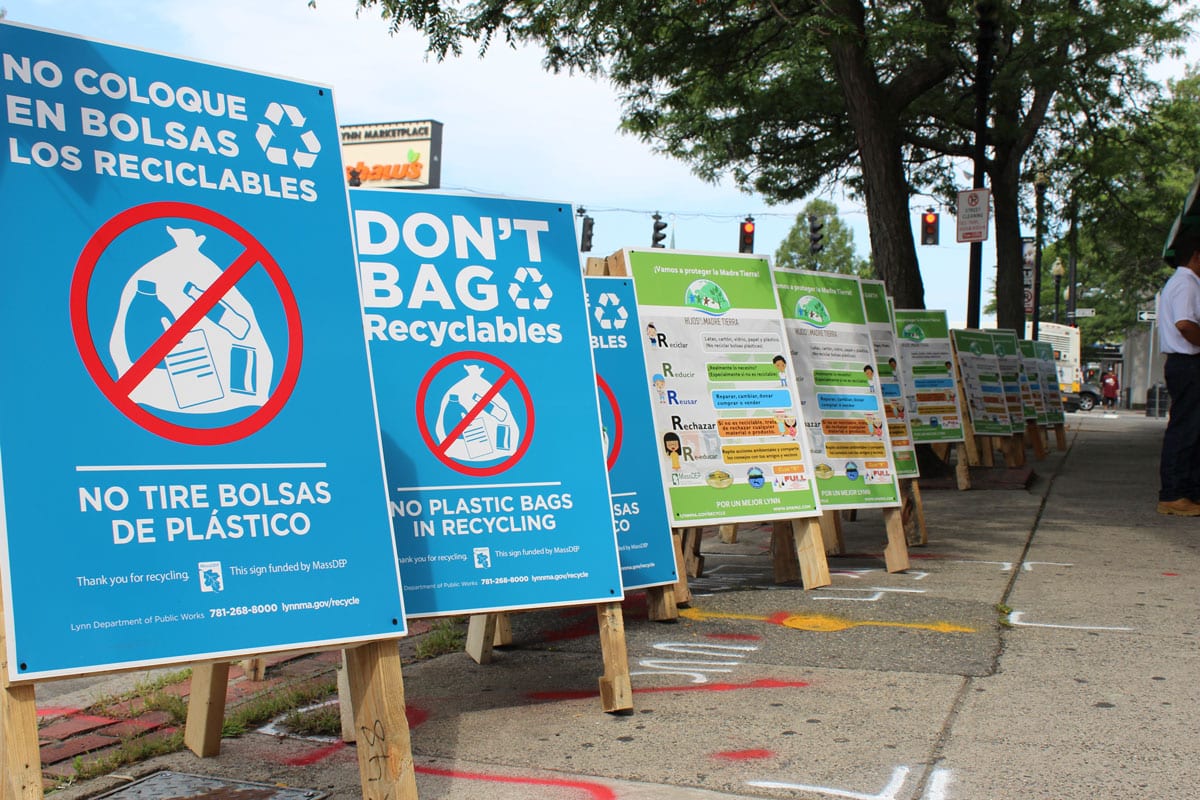Teaching others about the importance of recycling and how it can be done doesn’t need to take place in a classroom or formal setting.
In fact, volunteers have a better solution: taking education to the sidewalks.
The Global Embassy of Activists for Peace created recycled sidewalk displays throughout Lynn to give residents the knowledge to help themselves and the city go green.
The institution, with projects spanning across 20 countries, partnered with the Lynn Department of Public Works and RecyclingWorks to bring the resources curbside.
Signs will find homes on sidewalks around the city over the course of the next few weeks, educating people on not only how to recycle, but to reduce, reuse, reject, and re-educate others on practical environmental and sustainable efforts, said embassy volunteer Dulce Gonzalez.
The program reinforces the city-wide push to make Lynn a greener place through the “Recycling I.Q.” program funded through a grant from the Massachusetts Department of Environmental Protection (MassDEP).
The Recycling IQ Kit combines an aggressive campaign of education and direct feedback curbside. Included in the education efforts are a direct mail piece to all residents, newspaper ads, social media ads, along with messaging on billboards, banners, store signs and sandwich boards that will be placed around the city. Using grant funds, a team of summer workers will be hired from June through the end of September to implement the curbside feedback program that will target more than 5,000 households on every recycling collection route in the city.
For Gonzalez, who stood along Market Street with a team of five volunteers educating from the street, said it’s all about waste discipline to become environmentally friendly.
“Reject the consumption of products you don’t need,” she said. “Ask yourself the question: do you really need to use a straw at a restaurant?”
It doesn’t stop with just what you can do, she said. It’s a responsibility to teach others.
“It’s also about instilling these habits in your families and friends,” she said.
Gonzalez said interacting with people on the streets has been highly effective.
Last summer when the group tried a similar method to educate, Gonzalez said they spoke to more than 1,800 about recycling initiatives in Lynn over the course of a few months.
The signs lining sidewalks around the city have been built by six volunteers over 120 hours with reused palettes.
Presented in both English and Spanish, Gonzalez said the organization welcomes questions from the community on how they can be green.
Since the Lynn DPW has started the Recycling IQ program, practices have been used to further the mission to get more households to recycle, and to recycle correctly.
Julia Greene, Lynn’s recycling coordinator, said workers will be lifting the lids of more than 5,000 recycling carts daily on both green and blue recycling weeks as part of the program.
“If we find a large amount of plastic bags, trash or other things that don’t belong in the recycling cart, we will be tagging those carts with an ‘Oops’ tag, which will signal to Waste Management to not pick up the carts,” Greene said.
Before the program was implemented, Lynn had virtually unlimited trash pickup, which gave no incentive for residents to recycle, resulting in one of the lowest recycling rates in the state at just under eight percent. The first year of the program saw the recycling rate increase to 21 percent, and a 25-percent decrease in solid waste. The data for 2016 show continued improvement, although the numbers are not as dramatic.
Although the tonnage for recycling is up, and the recycling rate increased to 22 percent, there is a good amount of contamination, especially with plastic bags. Residents are encouraged to bring clean plastic bags back to grocery stores.
Lisa Nerich, Lynn DPW Associate Commissioner, said the initiatives by the Gonzalez family and Global Embassy of Activists for Peace placing signs in public areas for extra visibility on how residents can help.
“We’re getting green,” she said. “Day by day we are all working with neighborhoods to go green.”

